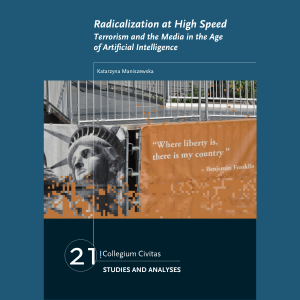
Collegium Civitas is proud to present the latest addition to its prestigious Studies and Analyses series (Volume 21): Radicalization at High Speed. Terrorism and the Media in the Age of Artificial Intelligence, authored by Dr. Katarzyna Maniszewska, Vice-Rector for International Relations at Collegium Civitas.
In this insightful study, Dr. Maniszewska explores how terrorist organizations leverage modern media—particularly social media and AI-driven technologies—to spread propaganda, recruit followers, and manipulate public opinion. The book examines the evolving relationship between terrorism and media, providing an in-depth analysis of strategies used by extremist groups to exploit digital platforms.
Building on years of research, Dr. Maniszewska offers a comprehensive look at how media landscapes have shifted since the early 2000s, adapting to new technological advancements. Through case studies and expert interviews, Dr. Maniszewska identifies emerging trends, challenges, and counterstrategies to combat terrorist propaganda in the digital era.
The publication has been highly praised by leading experts in the field:
In ‘Radicalization at High Speed,’ Dr. Maniszewska deftly navigates today’s online universe where social media influences have more clout than scholars and journalists and where generating empathy and sympathy, not fear, has become terrorism’s 21st-century communications modus operandi. An immensely timely and valuable contribution to understanding the evolving dynamics of contemporary terrorist communications, this report is required reading for all those tracking the trajectory of terrorism at the dawn of the age of AI.
Professor Bruce Hoffman, Georgetown University and the Council on Foreign Relations
Dr. Maniszewska has an encyclopedic knowledge of the history and constant evolution of the complex relation between terrorists and communication. In this report, she unpacks some of the latest trends related to the phenomenon, providing methodological rigor, clear analysis, and up-to-date insights that can help both experts and laypeople understand how terrorists frame and seek to convey their ideas.
Dr. Lorenzo Vidino, Director of the Program on Extremism at The George Washington University
This publication is a must-read for scholars, policymakers, and anyone interested in counterterrorism, media studies, and global security.
We encourage you to read the full publication.

